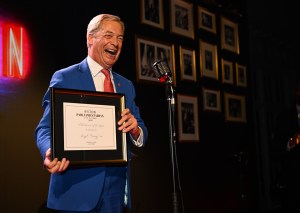Last Sunday night 8,000 illuminated balloons, tethered along eight miles of Berlin’s former inner-city border between East and West Germany, were released into the sky to commemorate the dismantling of the Berlin Wall 25 years ago. The wall, built to stem a growing flood of East Berliners to the western part of the city, had stood from 1961 until 1989, when it was breached as the consequence of a muddled East German response to a wave of protest by people demanding democracy and freedom of movement against a background of liberalisation in the Soviet Union. East Germany’s communist government suddenly announced that its citizens would be allowed to travel, and tens of thousands of them turned up at a checkpoint where border guards, lacking any clear instructions, let them through.
The wall stood for 28 years, but I missed it altogether. I have only visited Berlin twice — the first time in 1960, a year before the wall went up, and again in 1996, seven years after it came down. I have never been back. The first visit was memorable. I was a 20-year-old university student at the time and somehow got selected as a member of the youth section of the Anglo–German Koenigswinter Conference, which had been founded soon after the war as a talking shop to foster better relations between Britain and Germany.
I found myself warming much more to the young socialists there than to the young Conservatives
We were the guests of a group of German students in West Berlin; and while they were courteous, hospitable and eager to discuss important European questions, we were almost totally uninterested in anything but ourselves. Apart from me, who was politically uninvolved, our group was almost equally divided between young socialists and young Conservatives, who loathed each other and, showing no interest whatsoever in the opinions of our intelligent German hosts, spent most of the time arguing acrimoniously among themselves. My main function, as the only pianist present, was to accompany their singsongs in the evening, when they would take turns singing ‘Land of Hope and Glory’ and ‘The Red Flag’.
I found myself warming much more to the young socialists there than to the young Conservatives, the former seeming more convivial and amusing than their stuffy counterparts, and this was probably the main reason why I voted Labour in the next few elections. And I particularly liked John Smith, the party’s future leader, with whom I stayed intermittently in touch for the rest of his life. Berlin was a grim town then: the western part was still heavily scarred by wartime bombing, but the addition of new Stalinist tower blocks made the eastern part even grimmer.
There was no wall then, but only foreigners were allowed to visit East Berlin, from which West Berliners were firmly excluded. So we, the British delegates, were waved goodbye by our West Berlin hosts as we set off in a bus for the communist unknown. We had no clear idea where we were going, but our destination in East Berlin turned out to be the home of a Lutheran pastor, who escorted us to his church hall for a meeting with his parishioners. There we were subjected to a series of speeches on the iniquities of the East German regime, its persecution of Christians, and so on; complaints that it seemed surprising to hear publicly aired in the Stasi-infested capital of this repressive state.
Then they sang us some hymns, and the pastor asked us to sing them some English hymns in return. It had been a disastrous misunderstanding. He was under the impression that we were a Christian delegation from Coventry, seeking reconciliation after the destruction of Coventry Cathedral in the war, but there was no way that a bunch of Young Socialists and Young Conservatives could have been persuaded to sing a song together, even if they had had a song in common. We can only have done more damage to Anglo–German relations.
My second visit to Berlin, in 1996, was to interview Daniel Harding, a now renowned British conductor but then a promising 20-year-old assistant to Claudio Abbado, musical director of the Berlin Philharmonic. It had then been without its wall for seven years and had been largely rebuilt, but it still felt rather grim. Eight years later, in 2004, its mayor, Klaus Wowereit, described it as ‘poor but sexy’. Now, after a further ten years, it is not just sexy but also rich — and, I read, the world’s greatest magnet for dissipated youth. It is a centre of Bohemian decadence that reminds people of the Weimar Republic and of Christopher Isherwood. Who would have expected that the fall of the wall would lead to this?





Comments